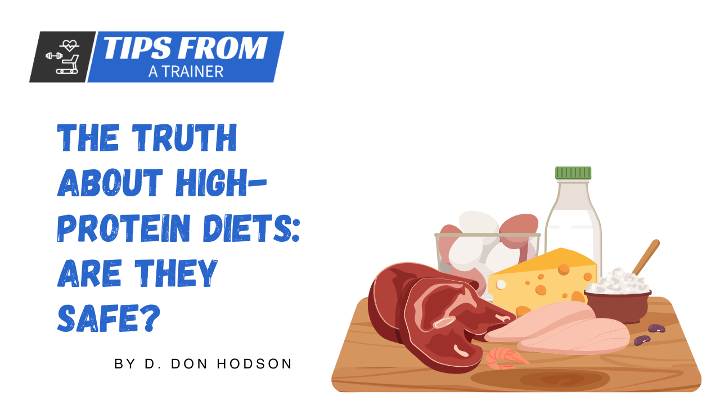Introduction
The Popularity of High-Protein Diets
In recent years, high-protein diets have captured the attention of health enthusiasts, fitness aficionados, and individuals seeking effective ways to manage their weight. The allure of these diets lies in their promises of accelerated fat loss, improved muscle definition, and enhanced overall well-being. The surge in popularity can be attributed to various factors, including compelling success stories, endorsements from fitness influencers, and scientific studies highlighting the potential benefits of protein-rich eating patterns.
Concerns and Controversies
While high-protein diets boast significant benefits, they have not escaped controversy and scrutiny. Medical professionals, nutrition experts, and researchers have raised concerns about the potential risks associated with these diets, particularly when followed without proper guidance and understanding. There is an ongoing debate regarding the long-term impact of elevated protein intake on various aspects of health, ranging from kidney function to bone health. This article aims to delve into the intricacies of high-protein diets, shedding light on both their potential advantages and potential drawbacks.
Purpose of the Article
The purpose of this comprehensive article is to provide a balanced and evidence-based analysis of high-protein diets. By examining the latest scientific research and expert insights, we aim to equip readers with a thorough understanding of the mechanisms, benefits, and potential risks associated with adopting a high-protein eating pattern. Our goal is to empower individuals to make informed decisions about incorporating high-protein diets into their lifestyles, while emphasizing the importance of moderation, balanced nutrition, and personalized considerations for long-term health.
Table of Contents
Introduction
The Popularity of High-Protein Diets
Concerns and Controversies
Purpose of the Article
The Basics of High-Protein Diets
Defining High-Protein Diets
Sources of Protein
Role of Protein in the Body
Benefits of High-Protein Diets
Muscle Building and Maintenance
Appetite and Weight Management
Metabolic Health and Blood Sugar Regulation
Potential Risks and Considerations
Kidney Health and Function
Bone Health and Calcium Balance
Digestive Issues and Micronutrient Intake
High-Protein Diets and Specific Populations
Athletes and Active Individuals
Older Adults and Muscle Preservation
Pregnancy and Lactation
Striking a Balance: Optimal Protein Intake
Recommended Protein Intake
Individual Variability and Goals
Combining Protein with a Balanced Diet
Practical Tips for Safe High-Protein Diets
Choosing Quality Protein Sources
Balanced Meal Planning
Monitoring Your Health and Adjusting
Conclusion
Navigating High-Protein Diets: Fact and Fiction
Making Informed Choices for Long-Term Health

The Basics of High-Protein Diets
Defining High-Protein Diets
A high-protein diet is characterized by a deliberate emphasis on increasing protein consumption while potentially moderating carbohydrate and fat intake. While there is no universal consensus on the exact percentage of macronutrient distribution that qualifies a diet as "high-protein," it generally involves obtaining a substantial proportion of daily caloric intake from protein-rich sources. This can lead to a shift in the body's primary source of energy, potentially influencing metabolic processes.
Sources of Protein
Protein can be sourced from a diverse array of foods, including both animal and plant-based options. Animal sources encompass lean meats, poultry, fish, eggs, and dairy products, while plant-based sources include legumes, nuts, seeds, tofu, and whole grains. Each source offers a unique blend of amino acids, the building blocks of protein, contributing to overall protein quality. Balancing protein sources allows individuals to access a wide spectrum of essential nutrients, further enhancing the potential benefits of a high-protein diet.
Role of Protein in the Body
Protein serves as an essential component of the human body, playing a pivotal role in various biological functions. From a structural standpoint, proteins form the foundation of muscles, tendons, ligaments, and skin. Enzymes, which are proteins, facilitate chemical reactions necessary for digestion, metabolism, and other physiological processes. Additionally, proteins are instrumental in maintaining a robust immune system, regulating hormones, and transporting oxygen throughout the body. As such, adequate protein intake is indispensable for optimal health and well-being.
Benefits of High-Protein Diets
Muscle Building and Maintenance
One of the most widely recognized benefits of high-protein diets is their role in promoting muscle growth and preservation. Proteins supply the body with the amino acids required for muscle protein synthesis, a process essential for repairing and building new muscle tissue. Athletes, bodybuilders, and individuals engaged in regular resistance training often prioritize protein intake to optimize muscle development. Furthermore, adequate protein consumption can assist in mitigating muscle loss during periods of calorie restriction, such as weight loss diets.
Appetite and Weight Management
Protein-rich foods possess satiating properties that can contribute to improved appetite control and weight management. Consuming protein triggers the release of hormones that signal fullness and reduce hunger, potentially leading to decreased calorie consumption. By promoting satiety, high-protein diets may aid in curbing overeating and minimizing the likelihood of weight gain. As a result, incorporating adequate protein into meals can be a strategic approach for those aiming to achieve and sustain a healthy body weight.
Metabolic Health and Blood Sugar Regulation
Emerging research suggests that high-protein diets may have a favorable impact on metabolic health markers. Protein consumption can influence insulin sensitivity, a crucial factor in regulating blood sugar levels. Improved insulin sensitivity may contribute to more stable blood glucose concentrations, reducing the risk of insulin resistance and type 2 diabetes. While further investigation is needed, preliminary findings highlight the potential role of high-protein diets in supporting metabolic well-being.
Potential Risks and Considerations
Kidney Health and Function
A subject of ongoing debate is the potential impact of high-protein diets on kidney health. Some concerns have arisen due to the potential for increased dietary protein to strain the kidneys. When protein is broken down, waste products, including urea and creatinine, are produced. In individuals with pre-existing kidney conditions, excess protein intake could potentially exacerbate kidney stress. However, current research suggests that individuals with healthy kidneys are generally well-equipped to handle higher protein intake without adverse effects. It is important to note that the majority of studies indicate that high-protein diets do not pose a significant risk to kidney function in healthy individuals.
Bone Health and Calcium Balance
Another consideration in the high-protein diet discourse is its potential impact on bone health. Some critics have raised concerns that increased protein consumption may lead to higher urinary excretion of calcium, potentially affecting bone mineral density. However, it is crucial to approach this topic with nuance. While high-protein diets may indeed increase urinary calcium excretion, they are not necessarily detrimental to bone health. In fact, protein plays a pivotal role in bone formation, and its potential influence on calcium balance may be offset by other dietary factors and a well-rounded intake of minerals like calcium and vitamin D.
Digestive Issues and Micronutrient Intake
Digestive discomfort is a potential concern when adopting a high-protein diet, particularly if the shift in macronutrient intake is sudden or drastic. Some individuals may experience bloating, gas, or constipation as their digestive systems adjust to increased protein intake. Gradually incorporating more protein into the diet and ensuring adequate fiber intake can help mitigate these issues. Additionally, high-protein diets have the potential to influence micronutrient intake. Relying heavily on certain protein sources may inadvertently lead to deficiencies in essential vitamins and minerals. Therefore, it is essential to prioritize a varied and well-balanced diet that includes a wide array of nutrient-rich foods.
High-Protein Diets and Specific Populations
Athletes and Active Individuals
For athletes and those engaged in regular physical activity, protein requirements may be higher due to the demands of muscle repair and growth. Protein intake can aid in post-exercise recovery by providing the necessary building blocks for repairing muscle tissue. Additionally, athletes involved in strength training or endurance activities may benefit from strategically timed protein consumption around their training sessions. Ensuring an adequate intake of protein can contribute to enhanced performance, reduced risk of overtraining, and overall athletic success.
Older Adults and Muscle Preservation
As individuals age, there is a natural tendency for muscle mass and strength to decline. High-protein diets hold promise in addressing this concern. Age-related muscle loss, known as sarcopenia, can be mitigated by a combination of regular physical activity and sufficient protein intake. Protein consumption helps stimulate muscle protein synthesis and provides amino acids essential for maintaining muscle mass. Therefore, older adults may benefit from incorporating higher protein levels into their diets to promote healthy aging and maintain functional independence.
Pregnancy and Lactation
The consideration of high-protein diets extends to pregnant and lactating individuals. Protein is vital for the growth and development of the fetus, as well as for supporting the increased nutritional needs during lactation. However, specific protein requirements during pregnancy and lactation may not be significantly higher than those for non-pregnant individuals. Pregnant and breastfeeding women are encouraged to prioritize a balanced diet that meets overall energy and nutrient needs, with protein playing an essential role in the mix. Care should be taken to select protein sources that align with individual dietary preferences and needs.
Striking a Balance: Optimal Protein Intake
Recommended Protein Intake
Determining the ideal amount of protein to consume can be a nuanced process influenced by several factors. Recommendations for protein intake are typically expressed in grams per kilogram of body weight. For sedentary individuals, a general guideline is around 0.8 grams of protein per kilogram of body weight per day, which is considered adequate to meet basic nutritional needs. However, those engaged in regular physical activity or seeking specific fitness goals may require higher protein intakes. For example, endurance athletes might benefit from a range of 1.2 to 1.4 grams per kilogram, while strength-trained athletes could aim for 1.6 to 1.7 grams per kilogram.
Individual Variability and Goals
It is crucial to recognize that protein needs are not one-size-fits-all and can vary based on individual characteristics. Factors such as age, gender, activity level, and metabolic rate play roles in determining optimal protein intake. Additionally, the objectives of individuals—such as building muscle, losing weight, or maintaining overall health—will influence their protein requirements. Adjusting protein intake to align with specific goals ensures that individuals can maximize the potential benefits while avoiding unnecessary excess.
Combining Protein with a Balanced Diet
While protein is a crucial component of a healthy diet, it is essential to integrate it within the context of a balanced nutritional plan. A diet that solely emphasizes protein at the expense of other essential nutrients can lead to imbalances and potential health risks. Therefore, incorporating protein-rich foods into a well-rounded diet that includes an appropriate mix of carbohydrates, healthy fats, vitamins, and minerals is key. Striving for variety in food choices not only enhances nutrient intake but also helps avoid monotony in meals.
Practical Tips for Safe High-Protein Diets
Choosing Quality Protein Sources
Selecting high-quality protein sources is fundamental to the success of a high-protein diet. Lean cuts of meat, poultry without skin, fish, eggs, and low-fat dairy products are excellent animal-based options. Plant-based sources, such as beans, lentils, tofu, nuts, and seeds, offer valuable protein along with fiber and beneficial phytochemicals. Opting for minimally processed and nutrient-dense protein-rich foods contributes to an overall healthy diet.
Balanced Meal Planning
Crafting balanced meals that incorporate protein, carbohydrates, and fats fosters nutritional completeness. Aiming for a mix of macronutrients in each meal helps sustain energy levels, regulate blood sugar, and provide a spectrum of nutrients. For instance, pairing lean protein sources with whole grains and vegetables can create a satisfying and nutritionally rich meal. Including a variety of foods also contributes to the enjoyment of meals and supports overall dietary adherence.
Monitoring Your Health and Adjusting
Regular self-assessment and monitoring of health are crucial when following a high-protein diet. Observing any changes in weight, energy levels, digestion, and overall well-being can provide insights into the diet's compatibility with individual needs. Adjustments may be necessary based on personal responses and evolving goals. Consulting a registered dietitian or healthcare professional can provide valuable guidance and ensure that any modifications to protein intake align with long-term health objectives.
Conclusion
Navigating High-Protein Diets: Fact and Fiction
In conclusion, high-protein diets have gained substantial attention for their potential benefits in muscle building, weight management, and overall health improvement. While they offer promising advantages, it is vital to approach them with a balanced and informed perspective. Scientific research supports the efficacy of high-protein diets in various contexts, but it is equally important to acknowledge potential risks and consider individual variations. The interplay between protein intake, metabolic processes, and health outcomes is multifaceted and influenced by a range of factors.
Making Informed Choices for Long-Term Health
Making informed choices about high-protein diets requires a comprehensive understanding of their potential advantages and limitations. Individual needs, goals, and preferences should guide decisions regarding protein intake. Striving for a well-rounded and varied diet that includes high-quality protein sources and essential nutrients is key to promoting long-term health and well-being. By approaching high-protein diets with careful consideration and applying evidence-based principles, individuals can harness their potential benefits while prioritizing safety and sustainable dietary practices.

Don Hodson, Certified Personal Trainer
I'm Don, an ACE-certified personal trainer and the founder of Tips From A Trainer. With my passion for fitness and years of experience, I've helped countless individuals transform their physiques!
Having personally overcome weight challenges throughout my life, I understand the struggle. Through consistency, exercise, and a balanced diet, I have managed to stay in shape and I want to share my message with the world!
The fitness industry is fraught with misconceptions and deceptive practices, which is why I am committed to providing you with the truth.
- My Site: www.Don-Hodson.com
- My Company: www.ConnectedAgeMarketing.com

The Truth About High-Protein Diets